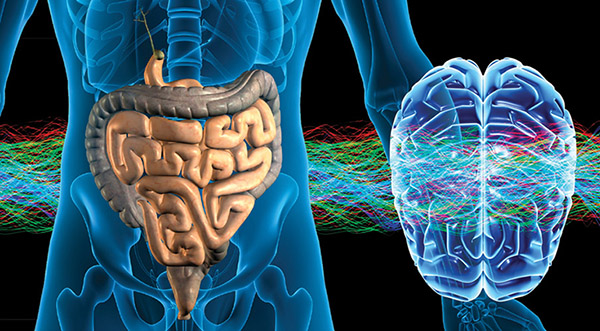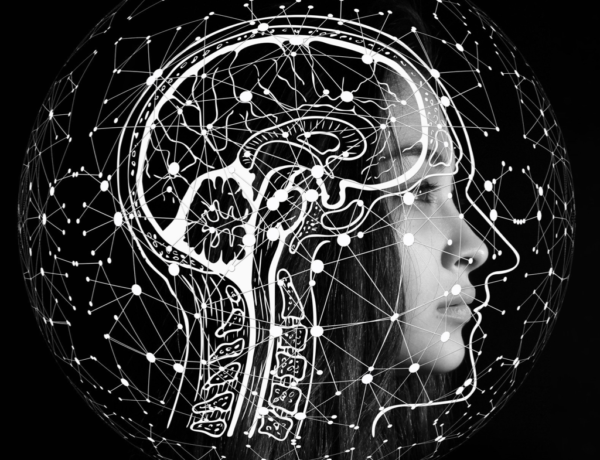Amazing Links between the Digestive System, the Mind and Moods
To summarize our previous discussion in Part 1 of this Health Awareness Newsletter article, it is now well recognized by science that 95% of Serotonin (a naturally occurring Neurotransmitter) is actually produced in the GUT and NOT in the brain as we WRONGLY had thought for many many years.
If we extend this concept to the other Neurotransmitters, this clearly means that whatever happens in our digestive system is going to affect our brain function. In order for people suffering from mood disorders such as Depression, Anxiety, ADD, ADHD, Dyspraxia, Dyslexia, OCD (Obsessive Compulsive Disorders), Bi-polar Disorders, or even Autism to have a chance to improve their state of mind, they need to improve their digestive function. This rightly implies changing their dietary habits, digesting and assimilating their food correctly, correcting the digestive flora, and eliminating any infectious agents.
Methodology
Keeping these facts and conclusions well in mind, my methodology of helping patients suffering from mood disorders are:
FIRST, Test their digestive system.
SECOND, Treat every single issue that may show up in their gut.
THIRD, Put patients on a healthy diet, and ensure that they are not allergic to any foods.
FOURTH, Address specific issues that may be corrected with different supplements and procedures (as described in Part 1 of this Newsletter article).
In Part 2, I am going to describe the other aspect of healing mood disorders which is principally, HOW to use Neurotransmitters properly. Supplementing with Neurotransmitters will help both the digestive system and the brain functions, as well as many other disorders.
What Are Neurotransmitters?
Neurotransmitters are endogenous (meaning made in the body) chemicals which relay, amplify, and modulate signals between a neuron and another cell. There are many different Neurotransmitters but, the major ones are divided into three categories:
1. AMINO ACIDS: Glutamate, Aspartate, Serine, Gamma-Aminobutyric Acid (GABA), Glycine.
2. MONOAMINES: Dopamine, Adrenaline (also called epinephrine), Noradrenalin (also called nor epinephrine), Serotonin, Melatonin.
3. OTHERS: Acetylcholine, Adenosine, Anandamide, Histamine, Nitric Oxide, etc.
Some Neurotransmitters (for example glutamate) are “excitatory”, which means that they increase the firing action of a cell. Others are “inhibitory”(such as GABA) which means that they have an inhibiting effect on a cell, and some others (such as Acetylcholine) have both effects.
Assessment of Neurotransmitters Deficiencies
When a patient comes to me with complaints of mood disorders, the following is the methodology I use to asses this person:
The first and most important thing is certainly to take in consideration the complaints of my patients. If someone tells me that he or she has been depressed since they can remember, it is evident that is a major component of their state of health. The principal tools that I use are two questionnaires that I extracted from extremely interesting books on this subject. The first one is called “The Neurotransmitter Questionnaire” from a book written by Dr. Eric Braverman, M.D. titled, “The Edge Effect”. This is a 12 page questionnaire that explores the multiple behaviors a person may have in different daily life situations. Dr. Braverman’s clinic in New York specializes in helping patients to improve their health with alternative medicines. The second questionnaire is called, “The Mood Questionnaire” extracted from a book written by Julia Ross, M.A. tilted, “The Mood Cure”. Julia Ross specializes into helping patients with eating disorders, mood disorders and addictions. Both of these authors are very well respected and recognized lecturers on the subject of Brain Disorders.
After a person completes these questionnaires, I analyze them in great detail. This gives me an accurate idea as to which of the main Neurotransmitters the person is deficient. Another way of testing Neurotransmitters deficiencies is through a urine sample test. This technology is still quite new and as such, there are a lot of on-going discussions as to its accuracy. I ran several of these urine tests and they always matched the results of the written questionnaires completed by the patients. This makes me think that the urine test is indeed valid, but for economical and practical reasons, for the moment I decided to use just the written questionnaires as they are accurate and they have no monetary cost associated with them.
These questionnaires reveal deficiencies in FOUR major Neurotransmitters:
1. Serotonin Deficiency
A lack of Serotonin is very common nowadays and the list of symptoms related to its deficiency is very long. Here are the major ones:
Depression, Impulsiveness, Lack of Common Sense, Lack of Pleasure, Isolation Behavior, Phobias, Paranoia, Perfectionism, Rage, Shyness, Confusion, Memory Loss, Difficulties Concentrating, Restlessness, Slow Reaction Time, Arthritis, Chronic Backaches, Butterflies in Stomach, Clammy Hands, Constipation, Drug and Alcohol Addictions, Headaches, Hypersensitivity, Hypertension, Sleep Disorders, Palpitations, PMS, Salt Cravings, Weight Gain, Nausea, and Night Sweats.
Serotonin is naturally occurring in foods that contain Tryptophan such as Turkey, Eggs, Avocado, Cheese, Chicken, Chocolate, Oats, Pork, Sausage Meat, Wheat Germ, and Whole Milk. Thus, it is recommended to be sure to include some of these foods in your daily diet. If that’s not enough, we have recourse to specialized supplements of which the most important Serotonin boosters are:Calcium, Fish Oils, 5HPT, Magnesium, Melatonin, and sometimes Sam-E, St John’s Worst, Passionflower, Pyridoxine (B6), or Zinc.
2. GABA Deficiency
GABA deficiency is probably as a common as is Serotonin deficiency. A GABA deficient person is very stressed. The major symptoms are: Anxiety, Panic Attacks, Insomnia, Depression, Feeling Overwhelmed, Manic Depression, Mood Swings, Rages, Obsessive Compulsive Disorders (OCD), Phobia, Fears, Rage, Restlessness, Short Temper, Attention Deficit Disorder (ADD), Disorganized Pattern, Impulsivity, Tremors, Sugar Cravings, Chronic Pain, IBS, Flushing, Headaches, Hyperventilation, Lump in the Throat, Night Sweats, PMS, Seizures, Tachycardia, Tinnitus, Twitching, and Frequent Urination.
GABA producing foods are mostly Complex Carbohydrates, such as Fruits and Vegetables, but also Whole Wheat, Oats, Rice Bran, Potato, Rice Bran, Walnuts, Almonds, Lentils, Broccoli, Beef Liver, Banana, Brown Rice, Halibut, Oranges and Spinach.
As far as supplements that help GABA production, we can choose a combination of: Inositol, Glutamic Acid, GABA itself, Melatonin, Thiamine (B1), Niacinamide, Pyridoxine (B6), Valerian Root or Passion flower. Sometimes and for specific issues I can also use Kava Kava, Taurine, B vitamins, Glycine, or Amino-acids.
3. Acethylcholine Deficiencies
The early signs of Acethylcholine deficiencies are related to a loss of thought like losing your enthusiasm for life and becoming forgetful. Symptoms may include Agitation, Anxiety, Alzheimer’s disease, Autism, Impotence, Learning Disorders, Fat Cravings, Frequent Bowel Movements, Lack of Arousal, Involuntary Movements, Reading and Writing Difficulties, Rigidity or Flaccidity, Slowness of Movement, Speech Problems, Bipolar Disorder, Calculation Errors, Hysterical Behavior, Mood Swings, Memory Disturbance, ADD, ADHD, Impaired Creativity, Impaired Thinking and Comprehension.
When your body shows Acethylcholine deficiencies, it is a sign that you need more nutrients rich in choline (a precursor to Acethylcholine) such as B Vitamins. Foods highest in choline are Egg Yolk, Meat, Liver, and Whole Grain Cereals. Also, Almonds, Hazelnuts, Macadamia Nuts, Artichokes, Broccoli, Brussels Sprouts, Cabbages, Fish, Peanut Butter, Pork, Shrimps, and Wheat Germ.
The supplements that we can use are: Choline, Phosphatidylcholine, Phosphatidylserine, Acetyl-L-carnitine, DHA, Thiamine (B1), Panthothenic acid (B5), Vitamin B12, Taurine, Gingko Biloba, and Korean Ginseng.
4. Dopamine Deficiency
If you are either burning too much Dopamine (burning the candle at both ends) or you are not producing enough Dopamine, you are going to feel tired, physically and / or mentally. The list of symptoms can be: Depression, Feeling of Worthlessness or Hopelessness, Procrastination, Mood Swings, Inability to Handle Stress, Isolation, Carelessness, Self Destructive Thoughts, Anger, Aggression, Anemia, Thyroid Disorders, Tremors, Sugar, Carbohydrates or Junk Food Cravings, Parkinson’s Disease, Nicotine Cravings, Narcolepsy, Low Sex Drive, Diabetes, Excessive Sleep, Constipation, Blood Sugar Instability, Failure to Follow Instructions, Lack of Memory, Slow Processing, ADD, Failure to Complete Tasks, Impulsive Behavior, and Poor Concentration.
To build up Dopamine levels, we need two amino-acids precursors which are Tyrosine and Phenylalanine. These amino-acids are found in proteins-rich foods, such as: Chicken, Chocolate, Cottage Cheese, Duck, Eggs, Oats, Pork, Ricotta, Turkey, Sausages, Walnuts, Whole Milk, Wild Game, Yogurt, and Wheat Germ.
The supplements that we can use are: Phenylalanine, Tyrosine, Methionine, Rhodiola, Pyridoxine (B6), B vitamins, Phosphatidylserine, and Ginkgo Biloba.
Careful Choice of Health Supplements
My choice of supplements is determined according to the patient’s symptomatology, history, diet and medication. Some Neurotransmitter supplements can actually interfere with medication, which is why I don’t recommend that you supplement yourself. It always needs to be done under the supervision of an educated and highly trained health professional.
Another important point is the fact that there are so many variants between brands for the same supplement. How do you know which one is the best? Those who know me are aware that I am a “fanatic” about researching the highest quality and the best possible supplements. I chose supplements from companies that stand behind their products, that have high standard of Quality Control, and that continually invest in current research. For any of these supplements to work properly, they need to have excellent quality raw materials, and must be without any fillers or colorings, have a significant amount of raw material per dosage and, they need to be completely absorbable. This is certainly NOT the case for all supplements out there in the market.
Conclusion
In conclusion, if you or a loved one suffers from various mood disorders, know that there ARE solutions that Naturopathy can help you if you are committed to engage into a journey that will lead you to better health. There is no magic pill or quick fix; it requires your dedication to a change of diet and lifestyle, and rigorous supplementation. It IS possible and it IS doable and, I can guide you through it.
We now know that our mood is in a close relationship to our digestion. We have the tools to find the causes of your digestive troubles and the tools to address them, so why not give it a try? Improving your health is the best thing you can ever do for yourself because without health, what do we have?
Yours in Health,
Béatrice Levinson, Naturopath
Videoconference & Phone Appointments Available
………………………………………………………………………………………………………………….
The entire contents of Health Awareness Newsletter are based upon the opinions of Béatrice Levinson, Naturopath, unless otherwise indicated. Individual articles are based upon the opinions of the respective author, who retains copyright as marked. The information on this website is not intended to replace a one-on-one relationship with a qualified health care professional and is not intended as medical advice. It is intended as an offering and sharing of knowledge and information from the research and experience of Béatrice Levinson, Naturopath within the U.S. and Europe. Béatrice Levinson, Naturopath encourages you to make your own health care decisions based upon your research and in partnership with a qualified health care professional.
© Copyright 2011 Béatrice F. Levinson, Naturopath. All Rights Reserved. This content may be copied in full, with copyright, contact, creation and information intact, without specific permission, when used only in a not-for-profit format. If any other use is desired, permission in writing from Béatrice Levinson is required.










No Comments